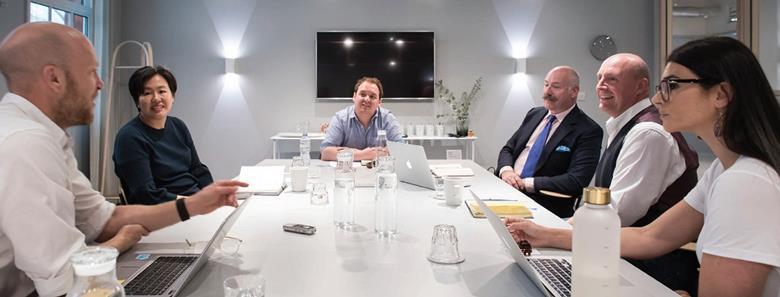New Yardi UK roundtable discussion: With more property companies launching flexible workspace brands, Property Week and Yardi gathered a panel of industry experts to identify the secrets of success in a highly competitive market. Justin Harley (JH) – regional director, coworking, Yardi Maria Cheung (MC) – director and head of interior design, Squire & Partners Giles Fuchs (GF) – chief executive, Office Space in Town Alessa McNally (AM) – head of member’s experience, The Office Group John Williams (JW) – head of marketing, The Instant Group Simon Creasey (SC) – (moderator) contributing editor/features, Property Week What are the key components needed to create a successful flexible workspace brand? GF: Location, design, building layout, staff, culture, ethos, IT, consistency of customer service. You can go on forever making a list, but all of those things need to be a part of it. AM: Location is absolutely key. It’s definitely at the top of the list of things we look for when opening up a space. Also member experience. We are here to create a memorable experience for our members. JW: I agree, it’s all about the member experience. The conventional real estate market is still referring to the ‘occupier’ or the ‘tenant’. They’re thinking about looking after an asset and not providing an experience, which is what flexible workspace providers do so well. Once people experience the flexible workspace market I think it’s a shock when they go back to conventional office space because the level of service just isn’t there. What makes a great location for a flexible workspace centre? GF: We previously had a company that covered the whole of the UK and when we opened a property outside London one of my metrics was it had to be five minutes -walk from a Marks & Spencer. In London, our MO is that the location has to be within a four-minute walk – five minutes is probably okay – of a tube or rail hub. JW: I said two years ago that we were going to start to see the rise of second cities and coworking and flexible space becoming a story in the regions and I’m glad to say I was right. Demand for flexible workspace in cities like Bristol, Birmingham and Manchester is increasing by 25% to 30% every single year at the moment. Those secondary cities in the UK are really flying and we’re also seeing that in Europe and in the States. How important is design and fit-out to a flexible workspace brand? MC: It’s become massively important. It should have always been massively important, but the standards have been raised and everyone is really enjoying and realising the benefit of great design in the workspace. It’s no longer about sitting at a fixed desk. We are working in different ways. People want to be able to sit, to stand, to walk around and look at things. Design can enhance and allow different ways of working through the use of things like natural light, biophilia, control of the environment and even acoustics. JH: One of my favourite spaces in London is [flexible workspace provider] Uncommon. They have a lot of biophilia, but it’s the scent in their buildings that’s really beautiful. Smell is one of the most important senses. JW: I think there is a perception of how coworking and flexible space should look; it’s a bit like coworking design bingo. There should be exposed brickwork, free beer, lots of dogs and avocados on tap, but that’s not the case. There is a real individuality of different approaches and different spaces being provided. In the flexible workspace and coworking sector the word ‘community’ pops up time and time again. How important is it to create a sense of community in your flexible workspace? MC: When we created The Ministry [The Ministry of Sound’s private members club and coworking space] we worked closely with them...
Must-Have 2019 Tech
For the coworking space
While the coworking industry continues to expand, its important to keep up with the best new technology. Let’s take a look at some of the most latest critical tech components for coworking spaces. CRM Every coworking space should absolutely have a CRM in place. It is truly one of the most integral components to a modern thriving workspace. Not only does it assist in lead tracking, but a CRM will improve your relationships with your current and prospective members. A CRM will streamline lead entry, customer life cycle tracking, vendor relationship management, and many other operational tasks. It drives efficiency and will enhance productivity, and directly leads to greater profitability. The technology-driven corporate world we live in today demands a CRM. According to a study by Gartner, CRM will be the single largest revenue area of spending in enterprise software by the year 2021. Not only is the CRM going to be a core tool for sales and marketing, but it will also benefit customer service. Since your members are reaching out via social media, phone, chat, email, and any other method they can find, it’s important to consolidate all their interactions in one place. The uses of a robust CRM are virtually limitless for all aspects of a successful coworking space. Automated Billing Whether you operate one space or multiple locations, automated billing is a vital component for success. Consider the time you’re spending balancing and reconciling your books. Consider the outsourced cost if you hire a bookkeeper. With the market becoming more competitive, shared space supply is increasing, and organized operators can run more efficiently. In many cases, operators streamlining their business with automated billing (among other tech solutions) can offer the same product at a more competitive cost. Standout softwares combine an accounting package with merchant services. Yardi KUBE...
Coworking Revolution
Becoming mainstream in UK
Increasingly, companies don’t have a five-or 10-year vision based around a particular space with a particular staff mix. They want short-term arrangements where they can flex their head count and floorspace up or down depending on need. This applies to businesses both large and small. While coworking once meant an office for four to six people, today deals are being signed for spaces that will accommodate 25, 50 or even 100 staff. Coworking also helps firms to retain the best employees by providing them with a stimulating and collaborative working environment. Sitting behind all of this is new technology which means that operating or using a coworking space is more streamlined than ever before. But with so many coworking spaces springing up, competition is getting ever more intense. So what can operators do to make their schemes are a success? Businesses today are looking for more than just a desk, a telephone and an internet connection – they want a level of service on a par with what you would expect in a high-end hotel. Years ago, we used to call the people sitting in the entrance ‘receptionists’, but today we refer to them as ‘front-of-house.’ In a successful coworking space they should engage with members, know them by name and be on hand to manage all aspects of the customer experience. Technology is a big part of this. A fast, reliable internet connection is crucial to most businesses and Yardi’s software means access to spaces is seamless, so when a member enters a coworking space they are instantly recognised and connected to the wifi. This can even work across multiple coworking locations. Unlike more traditional companies where most staff leave the building between 5pm and 6pm, some companies operating out of coworking spaces...



